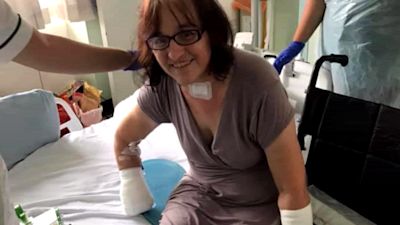Meet the ex-teacher who lost four limbs after Covid led to sepsis - and the dog who helps her cope

Watch as Caroline Coster tells school children about her experience, with ITV News Anglia's Graham Stothard
A retired teacher who awoke from a coma to find her hands and feet "dying" after Covid led to a severe sepsis infection says she knew immediately that her limbs had to go.
Caroline Coster emerged from an induced coma to find her body had been ravaged by sepsis, an extreme infection response that can lead organs to shut down and tissue to die.
She caught the virus in the early stages of the pandemic, and developed sepsis during her recovery period.
The Bedford 59-year-old was placed in an induced coma and nearly died twice before awaking to four blackening limbs and doctors telling her: "They're not going to come back to life’.
“And I said: ‘Well, you might as well take them off then, because they’re no good to me.’”
Despite her harrowing ordeal, Mrs Coster - forever a teacher at heart - has found a learning opportunity in her experience.
She is touring schools to tell children about her disability journey and share approaches to help them cope with their own difficulties in life.
This week, the mum-of-two even allowed Bedfordshire schoolchildren to meet the loyal friend who got her through the tough past year - her therapy dog, Duke.
In an assembly where no questions were off-limits, Mrs Coster encouraged children to learn about her experience in hopes of raising the youngsters’ awareness about living with disabilities.
The children were only too eager to engage, as she opened the floor for questions.
One concerned little girl asked: “Who makes you your breakfast?”
Mrs Coster told ITV News Anglia how her road to recovery from Covid had taken a dark turn.
“They diagnosed me with sepsis and I was put into an induced coma.
“I was in the coma for a month and in intensive care for a month and when I woke up, my hands and feet were black and they told me that they’d died.”
The sepsis infection had cut off the flow of oxygenated blood to her extremities.
After her quadruple amputation, Mrs Coster found solace in a furry friend.Duke never started out as a support animal.
But Mrs Coster, who was a teacher for 34 years, hopes his presence at her talks help the children through what's been a difficult time for everyone.
She said: "Duke has been registered as a pets as therapy dog, which means he can come in and help other people so they come in to help support the children.
"They'll read to him. They'll just cuddle him. It helps them calm down, and it helps those children who've happily movements.
"So I'm here as a source of emotional support for that.... just because I'm disabled, I'm still me, I'm still a person, and I'm also here selfishly for me."
What is sepsis?
Sepsis is sometimes called 'blood poisoning'
Sepsis is sometimes called 'blood poisoning'
According to the NHS, sepsis is a life-threatening reaction to an infection.
It happens when your immune system overreacts to an infection and starts to damage your body's own tissues and organs.
It is sometimes called septicaemia or blood poisoning.
It cannot be caught from another person.
What are the warning signs and symptoms?
What are the warning signs and symptoms?
Sepsis can be difficult to spot, and can move fast - which means it is vital to know the warning signs, which according to the NHS includes:
Acting confused, slurred speech or not making sense
Blue, pale or blotchy skin, lips or tongue
A rash that does not fade when you roll a glass over it, which is also a key symptom of meningitis.
Difficulty breathing, breathlessness or breathing very fast.
Someone with sepsis may not have all these symptoms.
When might you be at risk of sepsis?
When might you be at risk of sepsis?
Anyone who has had an infection is at risk of sepsis - even babies.
But some groups are at higher risk than others, according to the NHS:
Babies under 1, particularly if they're born early (premature) or their mother had an infection while pregnant
People over 75
People with diabetes
People with a weakened immune system, such as those having chemotherapy treatment or who recently had an organ transplant
People who have recently had surgery or a serious illness
Women who have just given birth, had a miscarriage or had an abortion
Mrs Coster was honoured with the MBE in the Queen's Birthday Honours for services to education and for charity in Africa.
Alongside her school visits, she raises awareness of sepsis, and money for schools in Kenya.
She also plans to return to Bedford Hospital with Duke to help others on the wards where she received life-saving treatment.
The visits are not just a hit with the children - but the teachers too.
Meppershall Church of England Academy head teacher Margaret Newman said: "We're so grateful to them coming in.
"If you think about the last couple of years, I think every child has suffered trauma at some level - whether it's not being able to see their grandparents or not being able to mix with their peers.
"So the fact that we've got Duke and Caroline coming in, it's therapeutic for everybody."